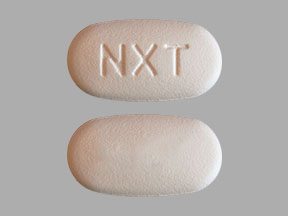Glecaprevir/pibrentasvir Disease Interactions
There are 2 disease interactions with glecaprevir / pibrentasvir.
Direct acting antivirals (applies to glecaprevir/pibrentasvir) immunosuppression
Major Potential Hazard, Moderate plausibility. Applicable conditions: Infectious Hepatitis, Immunodeficiency
HBV reactivation has been reported during or after completion of HCV direct-acting antiviral therapy in HCV/HBV-coinfected patients who were not receiving HBV antiviral therapy; some cases resulted in fulminant hepatitis, hepatic failure, and death. Cases have been reported in hepatitis B surface antigen (HBsAg)-positive patients and patients with serologic evidence of resolved HBV infection (i.e., HBsAg negative and hepatitis B core antibody [anti-HBc] positive). HBV reactivation has also been reported in patients using certain immunosuppressant or chemotherapeutic agents; risk of HBV reactivation associated with HCV direct-acting antiviral therapy may be increased in these patients. All patients should be tested for evidence of current or prior HBV infection by measuring HBsAg and anti-HBc before starting HCV direct-acting antiviral therapy. Patients with serologic evidence of current or prior HBV infection should be monitored for clinical and laboratory signs of hepatitis flare or HBV reactivation during HCV therapy and posttherapy follow-up; appropriate patient management for HBV infection should be started as clinically indicated.
Glecaprevir/pibrentasvir (applies to glecaprevir/pibrentasvir) liver dysfunction
Major Potential Hazard, Moderate plausibility. Applicable conditions: Liver Disease
The combination drug glecaprevir-pibrentasvir is contraindicated in patients with moderate or severe liver dysfunction (Child-Pugh B or C) or those with any history of prior hepatic decompensation; no dosage adjustment is required in patients with mild liver dysfunction (Child-Pugh A).
Postmarketing cases of hepatic decompensation/failure (including fatal outcomes) have been reported in patients treated with HCV nonstructural protein 3/4A (NS3/4A) protease inhibitor-containing regimens, including glecaprevir-pibrentasvir. Most patients with severe outcomes had evidence of advanced liver disease with moderate or severe liver dysfunction (Child-Pugh B or C) before starting glecaprevir-pibrentasvir, including some patients reported as having compensated cirrhosis with mild liver dysfunction (Child-Pugh A) at baseline but with a prior decompensation event (i.e., history of ascites, variceal bleeding, encephalopathy). Rare cases of hepatic decompensation/failure were reported in patients without cirrhosis or with compensated cirrhosis (Child-Pugh A); many of these patients had evidence of portal hypertension. Events also occurred in patients using a concomitant agent not recommended for coadministration, or in patients with confounding factors (e.g., serious liver-related medical/surgical comorbidities). In general, cases occurred within the first 4 weeks of therapy (median: 27 days). Hepatic laboratory testing should be performed as clinically indicated in patients with compensated cirrhosis (Child-Pugh A) or evidence of advanced liver disease (e.g., portal hypertension); such patients should be monitored for signs/symptoms of hepatic decompensation (e.g., jaundice, ascites, hepatic encephalopathy, variceal hemorrhage). Glecaprevir-pibrentasvir should be discontinued in patients who develop evidence of hepatic decompensation/failure.
Switch to professional interaction data
Glecaprevir/pibrentasvir drug interactions
There are 219 drug interactions with glecaprevir / pibrentasvir.
Glecaprevir/pibrentasvir alcohol/food interactions
There is 1 alcohol/food interaction with glecaprevir / pibrentasvir.
More about glecaprevir / pibrentasvir
- glecaprevir/pibrentasvir consumer information
- Check interactions
- Compare alternatives
- Reviews (431)
- Side effects
- Dosage information
- During pregnancy
- Drug class: antiviral combinations
- En español
Related treatment guides
Drug Interaction Classification
| Highly clinically significant. Avoid combinations; the risk of the interaction outweighs the benefit. | |
| Moderately clinically significant. Usually avoid combinations; use it only under special circumstances. | |
| Minimally clinically significant. Minimize risk; assess risk and consider an alternative drug, take steps to circumvent the interaction risk and/or institute a monitoring plan. | |
| No interaction information available. |
See also:
Further information
Always consult your healthcare provider to ensure the information displayed on this page applies to your personal circumstances.


